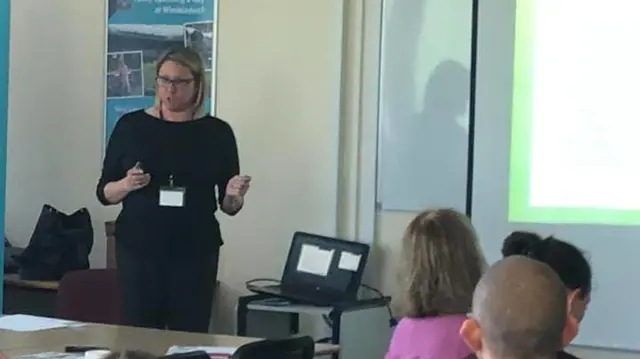
Becoming More Assertive and Building Your Confidence
Develop Strategies to Build Your Confidence and Learn How to Say No
Summary
- Reed Courses Certificate of Completion - Free
Add to basket or enquire
Overview
This course will help you to gain a deeper understanding of the concept of assertiveness, demonstrate assertive communication skills and develop strategies to build personal confidence.
By the end of the session, you will gain understanding of:
- Explore your reasons for wanting to become more assertive
- The differences between assertiveness, aggression and passivity
- The need for assertiveness in professional and personal communications
- The ability to respond to situations assertively
- Defining and modelling assertive communication behaviours
- Inward versus outer confidence
- Using your past experiences to develop a more confident future.
Certificates
Reed Courses Certificate of Completion
Digital certificate - Included
Will be downloadable when all lectures have been completed.
Curriculum
Course media
Description
Being assertive and confident is something that most people struggle with and, when polled, others have come up with questions such as these
- How do I resist the pressure of more dominant people?
- How can I feel more in control in certain situations?
- How do I get my point across without being talked over?
- How do I stand up to bullies?
We encourage you to examine your reasons for wanting to become more assertive, define situations or relationships in which you feel you lack confidence.
Sarah looks at the benefits to becoming more assertive both in your professional and personal life.
- It helps you build stronger and more satisfying personal and professional relationships
- It is an essential skill in leadership, helps you to develop your managerial potential
- You are better able to deal with problems and problem people
- Reduces frustration and confrontation
- Enables you to deal with issues before they escalate
In situations of stress, confrontation, dominance in others, frustration, our natural reaction as humans is to go into either fight or flight mode.
If we go into fight, there is a tendency to seethe internally, over-react, confront the person and become aggressive – sometimes without even realising we are doing this. Our natural instinct, what we think & how we feel take over how we communicate & behave
If we go into flight mode, we withdraw from the situation, avoid confrontation and repress our own opinions in favour of others. Once again, our natural instincts, what we think and how we feel take over how we communicate and behave.
Assertiveness is a choice, a skill that can be learned and practised, it begins with personal choice and self-control and the ability to;
- Change & control what we think
- Change & control how we feel
- Change & control how we behave and communicate
Sarah will explain the tools of communication we have as humans
- Visual Impression we create – body language, posture, facial expression, clothing
- Sound & tone of our voice - volume, pace, pitch, strength, inflection
- Language – words and phrases we use
Much of our ability to read and understand anther person comes from what we see, the visual impression includes;
- Posture- your spine, it creates an impression when you walk in a room
- Shoulders
- Head position
- Level / position
- Eye / facial contact
The tone of our voice carries a lot of information, remember, it’s not what you say, it’s how you say it….Research has found that during a quiz, when we feel more confident about knowing an answer to a question, we speak louder, more quickly and deeper.
- Clear, enunciated words
- More bass
- Appropriate volume
- Appropriate speed
What we say does have importance and getting the phrasing right is the foundation of conveying confidence.
- Words and phrases that match the needs of the person receiving the information
- Don’t apologise too much
- Be directive not requesting
- Will you close the window
- Please close the window
- Own your message
- I think, I feel, my opinion is...
- Remove passive phrasing and using words like 'only', 'just' or 'afraid'
Sarah will look at inner confidence and outer confidence
Inner confidence – programming, wiring, experiences and patterns of behaviour. What we believe and trust about ourselves.
Outer confidence – is the way we present ourselves,
They are often at odds with each other, we appear confident on the outside and yet feel anxious, over whelmed and unworthy on the inside.
To create a confident outer self, work on the inner self. This is much easier said than done but some tips include;
- Believe in yourself
- Talk positively
- Find your purpose
- Set goals and celebrate progress
- Support others
- Take care of yourself
Finally, practise and change the way you respond by looking at 3 situations and what passive, aggressive and assertive looks like for each.
Replace these situations with situations of your own, when you felt you could have responded more confidently, then work out the different responses.
Start the journey to becoming more assertive and confident.
Who is this course for?
Becoming more assertive and building confidence can benefit you in many areas of your life.
It can improve your communication skills
Clear expression of thoughts and needs: Assertiveness helps articulate ideas and preferences effectively, reducing misunderstandings.
Better relationships: Confident and assertive communication fosters mutual respect in personal and professional interactions.
It helps to establish healthy boundaries
Assertiveness enables people to set limits without guilt, protecting their emotional well-being.
It reduces the likelihood of being taken advantage of or feeling overwhelmed by others' demands.
It helps to enhance your decision-making skills
Confidence encourages individuals to trust their judgment and make decisions without excessive self-doubt.
Assertiveness aids in advocating for one's choices, especially in group settings.
It will boost your self-esteem
Taking assertive actions reinforces a sense of self-worth and self-respect.
Successfully navigating challenging situations builds a positive self-image.
It helps to advance your career opportunities
Employers value confident individuals who can communicate effectively, take initiative, and lead.
Assertiveness helps in negotiating salaries, promotions, or addressing workplace concerns.
It reduces stress and anxiety
Confident people feel more in control of their lives and interactions, which reduces stress.
Assertiveness minimizes resentment and frustration by addressing issues constructively.
Confidence and assertiveness encourage stepping out of comfort zones to take on new challenges.
These traits promote resilience and adaptability in the face of setbacks.
Developing assertiveness and confidence is an empowering process that helps individuals lead more fulfilling, balanced, and successful lives.
Requirements
There are no requirements to attend this course - apart from the desire to become more confident and assertive
Career path
Although there is no set career path associated with this course - it is recognised that confident and assertive people occupy positions that are appropriate to their skills, knowledge and experience. And they aren't afraid to ask for that salary increase.
Questions and answers
Currently there are no Q&As for this course. Be the first to ask a question.
Reviews
Currently there are no reviews for this course. Be the first to leave a review.
Provider
Established in 1999, Abbeydale Training provides high quality, bespoke training solutions to an impressive list of long-standing and very loyal clients including DLA Piper (one of the world's largest law firms), Princes Food and the UK Houses of Parliament (since 2011) as well as hundreds of smaller organisations in both the public and private sector.
Sarah Brooks', (joint MD of Abbeydale Training and the trainer on these courses) has a friendly style of delivery that, of course, includes theory but mainly focusses how it translates into real-life experiences. We have always used story-telling to bring our training to life and this has often been cited by delegates as an aspect of our training that has had the greatest impact for them - it has been gratifying to see that academic studies have recently confirmed and backed up our philosophy and approach.
Sarah has delivered training to thousands of people online and has always gets excellent reviews such as:
'This is my third course with Sarah this past week (obviously catching up on PD). But as I noted in a prior review, Sarah is a great presenter with some really good, common sense content. Definitely worth subscribing to her courses!'
'It is an informative and excellence course. It helps to broaden my understanding of learning skills, mentoring and coaching.'
'Yes very relevant to work situations frequently experienced.'
'Excellent course. Sometimes we think presentation skills are just common sense, but it's hard to articulate how to prepare for and deliver a great presentation. This course gave me confidence that these skills can be learned and honed through continuous practice.'
With over 7000 learners online Sarah has an average review score of 4.5 out of 5 and it is often said that Sarah is 'the best kept secret in the training world'
Legal information
This course is advertised on Reed.co.uk by the Course Provider, whose terms and conditions apply. Purchases are made directly from the Course Provider, and as such, content and materials are supplied by the Course Provider directly. Reed is acting as agent and not reseller in relation to this course. Reed's only responsibility is to facilitate your payment for the course. It is your responsibility to review and agree to the Course Provider's terms and conditions and satisfy yourself as to the suitability of the course you intend to purchase. Reed will not have any responsibility for the content of the course and/or associated materials.

